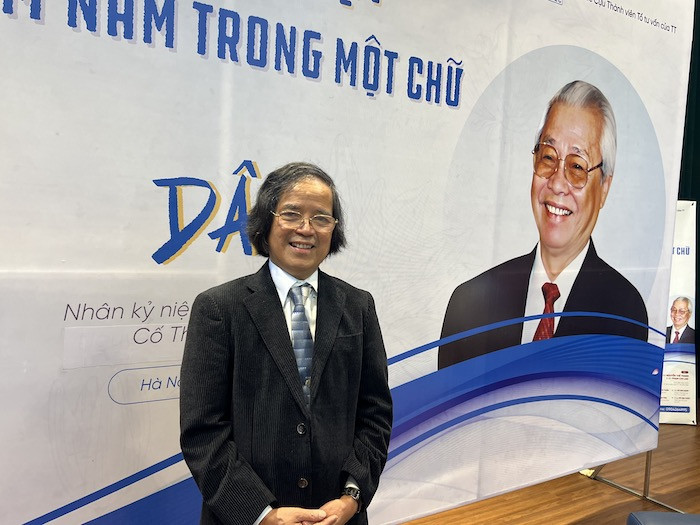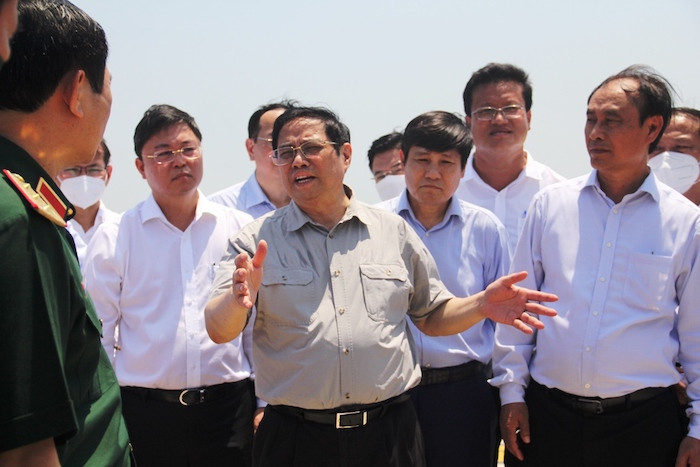A dream that spans decades

Professor of economics at Waseda University, Japan, Mr. Tran Van Tho is still full of enthusiasm for the industrialization and modernization process in Vietnam. During a recent talk with Vietnamnet, Prof. Tho passionately talked about the country's great transformation to modernity.
“Our country has deeply integrated into the world through signing 16 new-generation FTAs, but we still do outsource for foreign countries, mainly because we cannot produce components and accessories. We also haven't climbed up on the value chain yet. If this persists, it will be difficult for Vietnam to carry out deep and strong industrialization and modernization," he said.
“Our country has deeply integrated with the world through 16 new generation free trade agreements (FTAs), but so far, we have only stopped at the stage of processing and assembling products for foreign partners because we cannot produce components and accessories. We also haven't climbed up the value chain yet. If this situation persists, it will be difficult for Vietnam to carry out deep and strong industrialization and modernization," he said.
Industrialization and modernization of the country has always been a dream that haunts many generations of Vietnamese people after witnessing spectacular changes in the outside world after opening in the early 90s. Up to now, there have been about 20 resolutions related to industrialization and modernization issued, but that dream has not been realized.
A separate resolution on the goal of industrialization and modernization of the country to 2050 was issued, showing the aspiration to develop the country. Prof. Tho said: "Industrialization means that we have to produce many things ourselves so that our industry can move higher."
It is simple to say, but difficult to do. In 2007, the Prime Minister issued Decision No.55/QD-TTg identifying priority industries, including textiles and garments, leather and footwear, processing of agricultural, forestry and fishery products, steel production, bauxite mining and processing, and chemicals. More than 6 years later, this list added electronics, agricultural machinery, shipbuilding, automobile and spare parts manufacturing industries.
However, what happened after that, such as the failure of the Vietnam Shipbuilding Industry Corporation (Vinashin), Vietnam National Shipping Lines (Vinalines) and other industrial companies, shows that the longer the priority list, the harder it is to develop.
Simply, if all are prioritized to win, then no one has priority to win.
According to the Ministry of Industry and Trade, the electronics industry with an annual export value of up to 100 billion USD/year has a localization rate of only 5-10%.
The top foreign investor in Vietnam – Samsung - has established a supply chain with only 40 Vietnamese enterprises.
The comment made years ago "Vietnamese enterprises can't even produce a screw" is still true when it comes to the ailing state of the domestic industry.
An independent and autonomous economy

Prime Minister Pham Minh Chinh recently made the point that Vietnam needs to build an increasingly independent and self-reliant economy, which requires a strong team of local businesses. During a meeting with the Truong Hai Group, he said: "Many generations of leaders have wondered how to master the auto industry. So far, we have had corporates like Thaco and VinFast that have actively localized. A modern developed country must have modern industry.”
At the ceremony to ship Vinfast’s VF 8 electric cars to the US, the Prime Minister said: "We can be proud when Vietnamese-branded cars reach the global market. This affirms the correct policy of the Party and State, contributing to building an independent, self-reliant economy and actively integrating into the world”.
Vinfast's approach (building its own brands, mass production) is different and untraditional compared to the way the Japanese made cars decades ago. However, the number of such groups in Vietnam is modest. Vietnam has been becoming an increasingly large market for imported cars and other products.
According to the Ministry of Industry and Trade, Vietnam is currently in the transition from stage one to stage two in the process of industrial development, in which the level of technology absorption and production management level are still low. In other words, the Vietnamese economy has passed the development stage 0 (monoculture, subsistence agriculture, dependent on aid) and is in stage 1 (simple production under the guidance, coordination of foreign investors) to move to development stage 2 (development of supporting industries still under foreign investors’ guidance) in the 5-stage development process.
Head of the Central Economic Commission Tran Tuan Anh acknowledged a series of difficulties when the target of industrialization was not achieved in 2020.
Business philosophy for society, the country, and the nation’s future
For his part, Professor Tho said again and again that in order to carry out industrialization, it is a must to support the development of domestic enterprises. “Most Vietnamese enterprises are small and medium ones, which face difficulties in having access to capital, land and resources, plus cumbersome administrative procedures," he said, implying that to develop local businesses, it is necessary to remove current barriers. He added that it is necessary to quickly improve the education system to train skilled workers.
In the book "Japanese economy - the period of miracle development 1955-1973", Prof. Tho analyzed the basic features of the current economic structure of Vietnam such as the proportion of the individual economy and small and medium enterprises that is similar to Japan in the mid-1950s, when this country began a period of miraculous development. In Vietnam, he advised, it is necessary to uphold the business philosophy for the sake of society, for the country, for the future of the nation.
Explaining the miraculous development of Japan after so much pain after World War II, he wrote: “…the people believed in the future of the country, everyone dreamed of a bright tomorrow and feels responsible for making dreams come true. The atmosphere was generally like that, but who was the person who led the public opinion to create belief and blow into people's souls that dream? It was political leaders, intellectuals, and business leaders. With patriotism, a strong sense of pride and responsibility, they gathered the wisdom of all walks of life to make Japan overcome the desolation and ruin after World War II, and overcome the humiliation caused by being under the rule of the US military (until 1951) and rose to the status of a superior country”.
Those brave words of the Professor are valuable for Vietnam today before the road to prosperity in the future.
Lan Anh